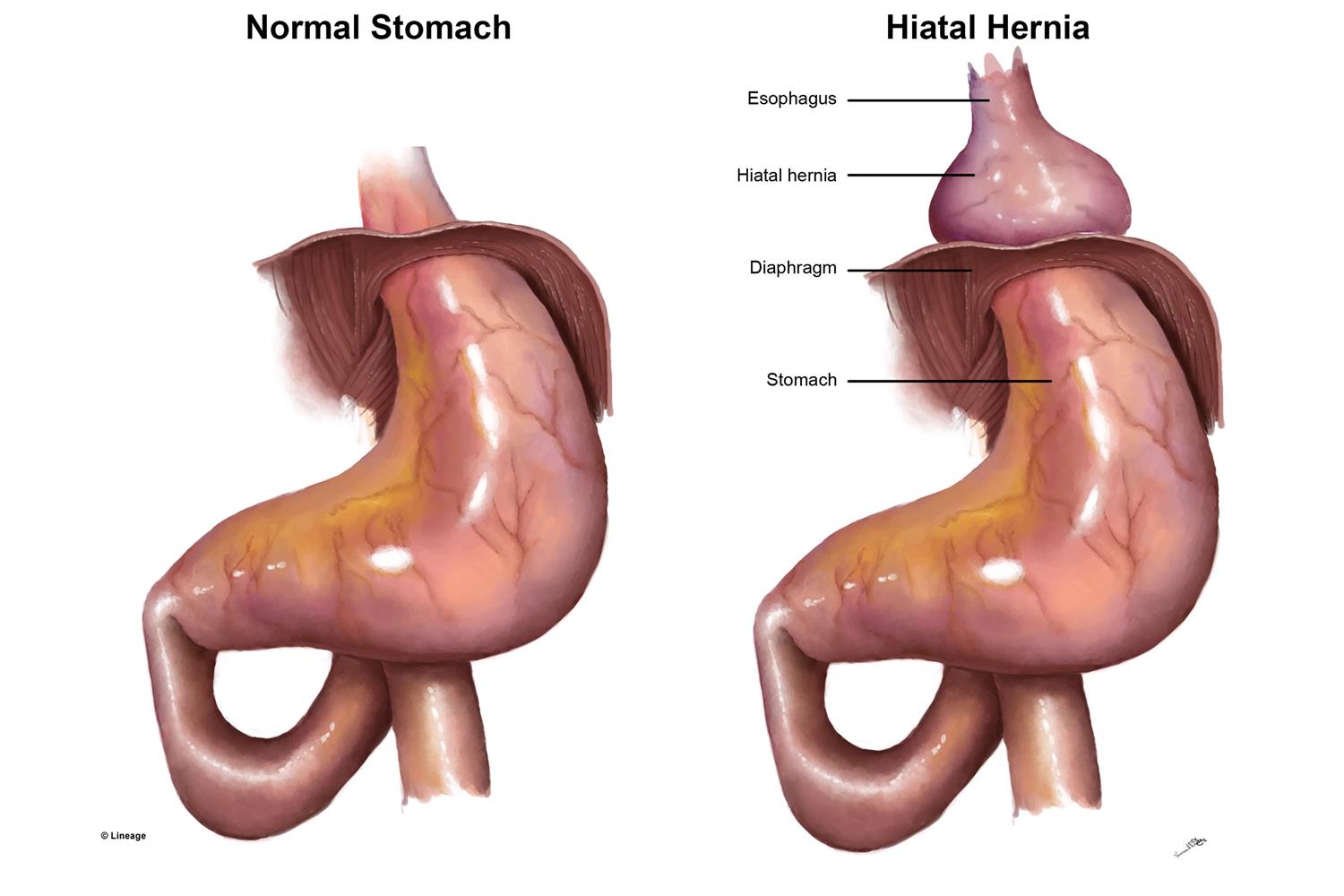Digestive System
Hiatal Hernia
By D.A. (staff writer) , published on October 28, 2020

Medicine Telehealth Health Hiatal hernia digestion digestive system
Hiatal Hernia
A hiatal hernia occurs when the upper part of your stomach bulges through the large muscle separating your abdomen and chest (diaphragm).
Your diaphragm has a small opening (hiatus) through which your food tube (esophagus) passes before connecting to your stomach. In a hiatal hernia, the stomach pushes up through that opening and into your chest.
A small hiatal hernia usually doesn't cause problems. You may never know you have one unless your doctor discovers it when checking for another condition.
But a large hiatal hernia can allow food and acid to back up into your esophagus, leading to heartburn. Self-care measures or medications can usually relieve these symptoms. A very large hiatal hernia might require surgery.
Symptoms
Most small hiatal hernias cause no signs or symptoms. But larger hiatal hernias can cause:
- Heartburn
- Regurgitation of food or liquids into the mouth
- Backflow of stomach acid into the esophagus (acid reflux)
- Difficulty swallowing
- Chest or abdominal pain
- Shortness of breath
- Vomiting of blood or passing of black stools, which may indicate gastrointestinal bleeding
Causes
A hiatal hernia occurs when weakened muscle tissue allows your stomach to bulge up through your diaphragm. It's not always clear why this happens. But a hiatal hernia might be caused by:
- Age-related changes in your diaphragm
- Injury to the area, for example, after trauma or certain types of surgery
- Being born with an unusually large hiatus
- Persistent and intense pressure on the surrounding muscles, such as while coughing, vomiting, straining during a bowel movement, exercising or lifting heavy objects
Hiatal Hernia Diagnosis
To diagnose a hiatal hernia, your doctor may do tests including:
- Barium swallow. You drink a liquid that shows up on an X-ray so your doctor can get a better look at your esophagus and stomach.
- Endoscopy. Your doctor puts a long, thin tube called an endoscope down your throat. A camera on the end shows inside your esophagus and stomach.
- Esophageal manometry. A different kind of tube goes down your throat to check the pressure in your esophagus when you swallow.
Hiatal Hernia Treatment
If you don’t have any symptoms, you might not need treatment.
If you have acid reflux, your doctor may suggest medications to treat those symptoms, including:
- Antacids to weaken your stomach acid
- Proton pump inhibitors or H-2 receptor blockers to keep your stomach from making as much acid
- Prokinetics to make your esophageal sphincter – the muscle that keeps stomach acid from backing up into your esophagus -- stronger. They also help muscles in your esophagus work and help your stomach empty.
Your doctor might do surgery if you have a paraesophageal hernia (when part of your stomach squeezes through the hiatus) so your stomach doesn’t become strangled.
Many hiatal hernia surgeries use a method called laparoscopy. Your doctor will make a few small (5 to 10 millimeter) cuts in your belly. They insert a tool called a laparoscope through these incisions, and it sends pictures to a monitor so your doctor can see inside your body. These “minimally invasive” procedures have smaller cuts, less risk of infection, less pain and scarring, and faster recovery than traditional surgeries.
References
An Overview of Hiatal Hernia (no date) WebMD. Available at: https://www.webmd.com/digestive-disorders/hiatal-hernia (Accessed: 20 October 2020).
Hiatal Hernia (no date). National Library of Medicine. Available at: https://medlineplus.gov/hiatalhernia.html (Accessed: 20 October 2020).
Hiatal hernia - Symptoms and causes (no date) Mayo Clinic. Available at: https://www.mayoclinic.org/diseases-conditions/hiatal-hernia/symptoms-causes/syc-20373379 (Accessed: 20 October 2020).
Hiatal Hernia: Causes, Types, Treatment, Diagnosis & More (2015) Healthline. Available at: https://www.healthline.com/health/hiatal-hernia (Accessed: 20 October 2020).
Find articles related to: Medicine Telehealth Health Hiatal hernia digestion digestive system
More articles about Digestive System
Back to the Health Tips Index




